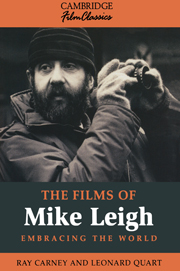Book contents
- Frontmatter
- Contents
- Editorial Note
- Acknowledgments
- Biographical and Cultural Introduction
- 1 Stylistic Introduction: Living beyond Consciousness
- 2 Fictitious Selves: Bleak Moments
- 3 Personal Freezing and Stylistic Melting: Hard Labour
- 4 Existence without Essences: The Kiss of Death
- 5 Defeating Systems of Knowing: Nuts in May
- 6 Losing Track of Who You Are: Abigail's Party
- 7 We Are the Hollow Men: Who's Who
- 8 Inhabiting Otherness: Grown-Ups
- 9 Manufactured Emotions: Home Sweet Home
- 10 Challenging Easy Understandings: Meantime
- 11 Holding Experience Loosely: High Hopes
- 12 Circulation Is the Law of Life: Life Is Sweet
- 13 Desperate Lives: Naked
- Epilogue: The Feel of Life
- Notes
- Filmography
- Bibliography
- Index
Epilogue: The Feel of Life
Published online by Cambridge University Press: 05 June 2012
- Frontmatter
- Contents
- Editorial Note
- Acknowledgments
- Biographical and Cultural Introduction
- 1 Stylistic Introduction: Living beyond Consciousness
- 2 Fictitious Selves: Bleak Moments
- 3 Personal Freezing and Stylistic Melting: Hard Labour
- 4 Existence without Essences: The Kiss of Death
- 5 Defeating Systems of Knowing: Nuts in May
- 6 Losing Track of Who You Are: Abigail's Party
- 7 We Are the Hollow Men: Who's Who
- 8 Inhabiting Otherness: Grown-Ups
- 9 Manufactured Emotions: Home Sweet Home
- 10 Challenging Easy Understandings: Meantime
- 11 Holding Experience Loosely: High Hopes
- 12 Circulation Is the Law of Life: Life Is Sweet
- 13 Desperate Lives: Naked
- Epilogue: The Feel of Life
- Notes
- Filmography
- Bibliography
- Index
Summary
We are in the business of not only making people believe and care and all those things, but laugh. We are in the business of being funny, basically, of being comedians, and that's not to be underestimated.
–Mike LeighOver the past thirty years or so, American artists and viewers have scaled down their expectations for the art of film. It is as if, as a result of the pervasive cultural hypocrisies, deceits, and betrayals of the seventies, eighties, and nineties, artists and intellectuals have lost faith in art as a form of truth. Engagement, seriousness, and sincerity have been revealed to be a mug's game so often that it appears that the only honest stance that remains is to stand outside the established systems of understanding, critical of all and believing in none. The ironic mode has, ironically enough, become the last refuge of the caring heart.
The result is the triumph of what Paul Ricoeur called “the hermeneutics of suspicion.” Skepticism (or the sterile formalism of academic criticism) fills the void left by faith. In a world where truth-telling is despaired of, one's powers of debunking, revealing, and exposing become the measure of one's virtue. Art and criticism become essentially negative in their functions. Art is viewed as existing solely to help us see through the limiting systems around us, and art that doesn't make that its main function is viewed as being complicitous with those systems.
- Type
- Chapter
- Information
- The Films of Mike Leigh , pp. 239 - 246Publisher: Cambridge University PressPrint publication year: 2000



